- Home
- Jane Arbor
Queen's Nurse
Queen's Nurse Read online
Queen’s Nurse
Jane Arbor
Whatever he wanted, Muir usually got!
Even before she knew who he was, Jess Mawney learned that Muir Forester was unusually strong willed.
Now she was practically living on the doorstep of this man—a man she might reasonably have hoped never to see again.
But Jess soon changed her mind about him. She wished that Muir Forester wanted her in the same determined way that was making him fight for the love of the beautiful and delicate Liane.
CHAPTER ONE
The road ahead lay in gentle folds like a ribbon being unwound from a broad spool; trees cast their shadows in fantastic lace patterns upon its surface, and in the full sunshine a constant maze of gnats danced in front of the hood of the small car that sped over the miles.
Neither of the car’s occupants had spoken for some time. The driver, Dr. Michael Leyden, seemed intent upon showing off its best paces to his passenger, and Jess Mawney beside him, as always at ease in his company, appeared lost in her own thoughts.
But at the next signpost Michael glanced briefly at her sweet, serious profile and said, “Five more miles now, Jess. Not looking forward to it, are you?”
Jess shook her head. “Not much,” she agreed. “But we needn’t stay for the whole of the sale, need we?”
“No longer than you say,” he assured her. “Vulcan here and I are at your service. You know that.”
“I do know,” smiled Jess. “It was sweet of you to drive me down, but you’ve got that appointment at the hospital this evening, and I’ve still some packing to do at the hotel. Really, I’d be glad to come away as soon as I’ve bought the Welsh dresser—the one I told you about. It’s an early item in the catalog, so it shouldn’t take long.”
“Would you like me to bid for it for you?”
“Please, Michael—” Jess broke off, and Michael, sensing the poignancy of her thoughts, said no more.
But presently he said rallyingly, “And how is it going to be ‘Jess Mawney, Queen’s Nurse’—fully fledged and with a district of her own?”
A charming blush warmed Jess’s cheeks. “In Crane-by-Sea I shall be nothing so impressive,” she smiled. “I shall be just ‘nurse’ to most people and at the whole district’s beck and call, not to mention Dr. Gilder’s!”
“But you are looking forward to it?”
“Yes, I am, though it may be an ordeal at first,” Jess said seriously. “I think I am welcoming it partly for the complete break it will mean—”
Michael momentarily laid a hand on her knee. “Don’t make it too complete, Jess.”
“No, I won’t. But you do understand, don’t you, that having to concentrate on new work in entirely new surroundings may help me to forget all—all this? I can’t help being grateful that I’d practically finished my district training when father died. When everything is over, as it will be after the sale today, I don’t think I could have borne to go on working at The Charter as if nothing had changed and as if home was still here in Little Newchamp, waiting for me whenever I wanted to come back to it. From now on home will be just where I am. I daresay I shall get used to the idea in time.”
Michael nodded understandingly, but did not speak, not wanting her to guess that she had hurt him by referring to The Charter Hospital as if he himself were not part of her associations there. Jess, poor kid, he thought compassionately, had enough to bear just now without the intrusion of his selfish claims upon her.
They were approaching Little Newchamp now, and after passing its first straggle of cottages, Michael turned into a side street and drew up before an auction room that was rented for occasional sales by a Maidstone firm.
“You’d like to go and have a look around, wouldn’t you?” he said to Jess. “I’ll take the car to the parking lot and join you later. Do you have your catalog handy?”
“Yes—in my handbag.” Jess watched the little car shoot away, then turned and pulled open the swinging door of the salesroom, flinching a little at the noise and the dust and the heat within.
Meanwhile, the main street of Little Newchamp had settled down to its usual closing-day siesta. The Tuck Shop was ready to do some business in ice creams when the children came out of school, and at the open doors of his garage Sid Maddon was gossiping with a gas salesman. For the rest, the shops were shuttered and silent, and both Sid and The Tuck Shop were ignored by the cars that flashed through on the highway from the south coast.
“You’d think some of them would want a fill-up,” grumbled the gas salesman.
“Yeah—or a repair job, wouldn’t you?” agreed Sid. His companion shaded his eyes and peered down the road. “Nice bit of homework coming now,” he commented. “What is she—can you see?”
Sid looked, too. “Heron Major,” he said briefly, then shook his head. “Sounds like she’s got a nasty knock in her engine though. Shouldn’t wonder if—”
He had not long to wonder, for the powerful car was already slowing and bearing in on the open sweep of concrete behind the gas pumps. The salesman effaced himself and Sid hurried forward.
“Trouble, sir?” he inquired of the driver, who alighted and towered above Sid as he stretched to his full height before replying.
“Yes. Have a look, will you? She hasn’t pulled properly since I left Maidstone.”
He stood by, tapping and lighting a cigarette while Sid buried a professional head beneath the hood. On emerging, Sid’s considered verdict was, “It’s the distributor. I’ll have to adjust the points and then test her. Take half an hour or so—maybe a bit more. Going up to town, sir?”
“Yes, and beyond—through the Blackwall or over the Ferry, but I’m not in a hurry, if you can make a job of it. Meanwhile—” turning to survey the quiet street with tolerant amusement “—I’m not likely to get into mischief while I wait, am I?”
Sid grinned. “No, sir. Nothing much doing in Little Newchamp—less still on closing days. But you might get a cup of tea at The Tuck Shop. Or wait now—there’s a sale on at Ramm’s Auction Mart, if you’re interested in such things?”
“Yes, I might look in. A furniture sale, you mean? Any good stuff, would you say?”
Sid considered the question. “Maybe. Maybe not. It’s only the contents of a house in the village, mixed with some other junk that Ramm’s would have had on hand. The owner—one of these scientific professors—died six weeks or so back. Well liked he was by everybody, and most folks’ll be glad to see his stuff go for a good price, because that money’ll be all his daughter will have when all’s done. She’s a nurse, working in London now, but of course we all knew her from when she was so high. Don’t suppose she’ll be down for the sale. She’ll know it won’t take long to sell all the professor had. And in any case, it’s no fun seeing your own stuff going to strangers, is it, sir?”
“I suppose not, though I haven’t had the experience myself. I’ll go along there, I think. There may be something interesting. Show me where, will you?”
Sid watched his client walk away before returning to his work. Money there, he thought, though without envy. The car’s appointments, the man’s clothes, the glinting gold of the cigarette case all spoke of it. Good job he’d thought to mention the sale. If the chap took a fancy to some of the professor’s stuff and paid a good price for it, that would do young Jess Mawney a bit of good, and there was nobody in Little Newchamp who’d be likely to quarrel with that...
The half hour before the auctioneer’s arrival was everyone’s chance to look and appraise and to discuss likely prices of the goods for sale, and many people who had, like Sid, known Jess all her life were also making it an opportunity to greet her with kindly, reserved sympathy and to assure her that she was going to have a good sale.
But at last
Jess stood alone near the rostrum, wishing with all her heart that the whole horrible business could begin, so that it might the sooner be over.
How forlorn and utterly bereft of its real personality furniture became, once it reached the indignity of a mixed salesroom! Did things then—furniture, china, one’s household goods—only come to life for you while you lived with them, dying a kind of death between being turned out of one home and being taken into another?
She had wondered that first when she had seen the last van door close upon the last of her father’s effects. She had longed then to have had time to ask him to allow her to keep back a few pieces—just those that were linked with her dearest memories of home.
But there had not been time ... When she had been called urgently from London there had been time for nothing but to bid a choked farewell to the silent, unconscious figure who did not even realize she was there. And when, afterward, Professor Mawney’s solicitor had assured her that she would be free to buy in anything she particularly wanted to keep, she had agreed bleakly that, in directing that everything should be sold at auction for her benefit, her father’s will had probably been well advised.
She had meant at first to earmark several things. But after a month of storage they looked so alien and unfamiliar that it would be easier now to let them go. Besides, in her district on the east coast she would be living in lodgings and so could only put into storage any furniture she might own until such time as she could hope for a little house.
Now, as she had told Michael, there was only one piece that, for memory’s sake, she must have and for which an accommodating landlady might be persuaded to make room. It was a seventeenth-century Welsh dresser that had stood in the friendly living room of her home, facing the garden window, always seeming to take all the sunshine there was into its very surface and reflecting it back in white highlights upon the old blue willow plates upon its shelves.
So far as she knew it had no very high intrinsic value, and she was not afraid of the price it might run to. She could see it from where she stood now. A tall man—a complete stranger to her—was examining it rather closely as if it interested him. Watching him, noticing an indefinable air of distinction about him, Jess was torn between pride that the dresser should have attracted him and a jealous fear that he might mean to bid for it against her. However, she supposed she must expect a little competition for it.
Now the auctioneer was mounting the rostrum, and Michael was at her side. She turned to smile at him, being grateful for his answering homely grin and for the staunch air of reassurance he brought with him.
When she first went to The Charter Hospital to do her general training, Michael had been a house physician almost as raw and inexperienced as she was, though by now he was on the short list for the next registrarship. When she had left The Charter for the Queen’s Institute of Nursing in preparation for district work, she had wondered if their friendship would lapse. But on Michael’s side it had strengthened into something warmer—a feeling that, though she was very fond of him, she did not return.
She had never been in love, but she knew instinctively that her own feeling for him held nothing of the “friendship lighted with passion” that should be implicit in a love that would last a lifetime. And in leaving London, however much she was going to miss their easygoing comradeship and his sturdy loyalty, she felt that she was doing the fairest thing for him, as well as the wisest for herself.
He nudged her arm gently. The dresser was being brought up now for display. It looked insignificant enough, she thought, to justify her hopes of getting it for less than the thirty pounds she meant to go to, though Michael knew she would go to ten pounds more if need be.
But to her surprise and dismay the auctioneer opened the bidding at forty pounds. She glanced quickly at Michael who signaled forty-five. Someone else, fifty. Michael went at once to fifty-five. The other bidder dropped out and for a moment Jess hoped, even if the price was ten pounds beyond her outside limit. But a different voice—belonging to the man Jess had noticed earlier—took the figure to sixty pounds.
“I’m going to plunge,” whispered Michael and went to seventy.
The stranger went straight to eighty.
“Ninety.” Michael had avoided Jess’s eyes.
“A hundred.”
After an instant’s hesitation Michael signaled, “... and ten,” with an aside, “It’s all right, I’m handling this,” to Jess.
She understood him well enough but, biting her lip, laid a restraining hand upon his arm. “Michael, I can’t—” But there was no time to explain to him that she could not possibly afford to spend so much of the total value of her sale, even on the dresser. And her rival retorted with a swift, “One hundred and twenty.”
The whole room was tense now—tense with the hostility of Jess’s friends and neighbors who guessed for whom Dr. Leyden was bidding and who sensed the meaning of the distress on Jess’s face.
It was a hostility that was almost a tangible thing, and as if he were suddenly aware of it the stranger raised his head and looked about him, at the upturned faces of the press of people around the rostrum, at Michael with cool interest, straight at Jess herself.
The glance, momentary as it was, was strangely compelling, and Jess’s quivering nerves longed to answer the challenge that she read into it, though of course he could not know that Michael was acting for her.
Michael shook off her hand, but his “one hundred and thirty” lacked confidence and seemed to invite the “—and forty” that was snapped back at him. Michael paused—and the auctioneer’s gavel came down.
One-hundred-and-forty pounds! A hundred more than the outside figure Jess would have dared to bid. She supposed she should feel glad of the unexpected money that would be added to the total, and people would tell her that she could buy another dresser for less than half the price. But it wasn’t the same thing at all, and it was with difficulty that she managed a smile for Michael.
“It’s all right,” she said. “I—did rather want it, that’s all. Let’s go, shall we?”
His hand rested protectively on her shoulder as he guided her through the crowd toward the door. Briefly Jess glanced back. But the next sale had already begun, and the dresser’s new owner was giving his name to the clerk.
Outside Michael said, “Jess dear, why didn’t you tell the auctioneers you wanted the thing? Then they would have withdrawn it at your price or thereabout.”
“Would they? Yes, I suppose they would. But I never thought there’d be any danger, you see.”
“And now the auctioneer is congratulating himself on getting you such a good price,” commented Michael ruefully. “Well, I’m only thankful we drove that beggar so high, if we had to let it go in the end.”
“I can’t think why he did it, unless he is one of those hateful people who can’t bear to be beaten to anything,” said Jess.
Michael nodded. “Could be. Rather like a road hog who’d crash rather than let another car overtake. It’s a type and a pretty objectionable one at that. I only wish you didn’t mind so much, Jess.”
“I don’t really. After all, I don’t know that I’d have anywhere I could put it, do I?”
Michael hesitated, wanting to say, “You could store it until you get married.” But instead he asked her to wait while he went to fetch the car.
Jess stood in the sunshine, wondering why she had said she didn’t mind when she did—more than she could have guessed. A wave of rebellion welled up within her, tempting her to refuse to accept defeat in something that she had allowed to matter so much.
What could she do? Nothing, she supposed. But on a blind impulse she turned back toward the salesroom just as someone else came out through the swinging door.
Afterward she told herself that if it had not been her rival bidder who had emerged, she would have done nothing more toward finding him, and if he had gone straight past her she would have let him go. But without glancing in her direction, he paused on the
pavement to take out his cigarette case, and almost before Jess realized it the rash, “Excuse me—” had sprung to her lips.
The stranger turned in surprise. One hand went to his hat, the other thrust the cigarette case back into his pocket. When Jess, confused, did not speak again at once, his eyes, gray and deep-set beneath inquiringly raised brows, surveyed her from his greatly superior height, making her feel too insignificant for comfort. As she noticed the stubborn line of his mouth and jaw the moment of her uneasy silence gave her time for one coherent thought—We were right about him. He has the power to get what he wants, and he is the type who could hate to lose to anyone else. I haven’t a hope—
On his side the man was recognizing her as the girl whose companion had been his competitor for the Welsh dresser. His glance confirmed his momentary awareness of her across the salesroom. Yes, it was the same girl—slim, dark haired and well groomed in crisp navy blue linen without a “fidget” of trimming anywhere and a simple straw hat, the attractive curve of whose brim any man could approve. In answer to her overture his, “Yes?” was cool but polite.
Jess gulped. “You—you bought a Welsh dresser just now—”
“Yes, I did. It was a good example of its kind.”
“But it wasn’t really a very good one, and I was—well, I wondered if you would reconsider it—whether you would resell it to me?” The words were out before she realized she was committing herself to paying him his own inflated idea of the dresser’s value. It was only as she sensed his recoil from the suggestion that she saw he thought she had belittled it in the hope that he might let her have it at less than he had paid.
He said coldly, “I shouldn’t dream of reconsidering it. I bought it because I happened to want it.”

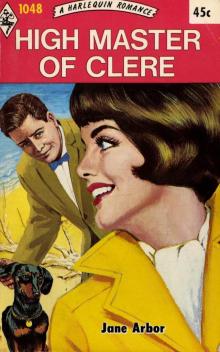 High Master of Clere
High Master of Clere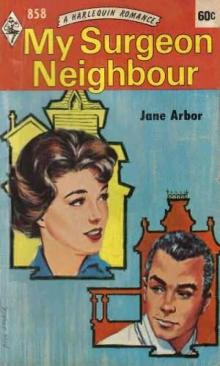 My Surgeon Neighbour
My Surgeon Neighbour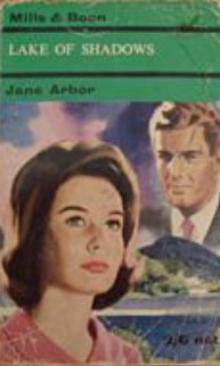 Lake of Shadows
Lake of Shadows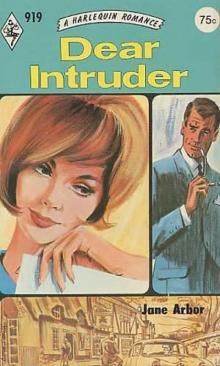 Dear Intruder
Dear Intruder Flash of Emerald
Flash of Emerald Return to Silbersee
Return to Silbersee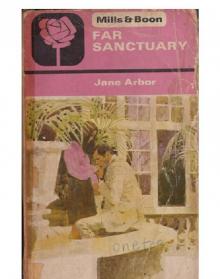 Far Sanctuary
Far Sanctuary Sandflower
Sandflower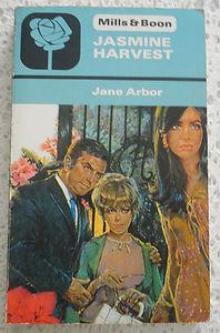 Jasmine Harvest
Jasmine Harvest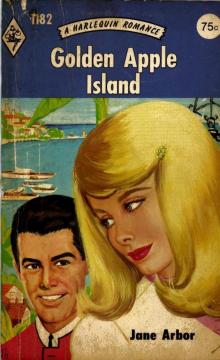 Golden Apple Island
Golden Apple Island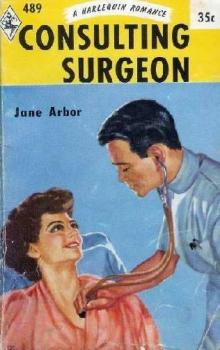 Consulting Surgeon
Consulting Surgeon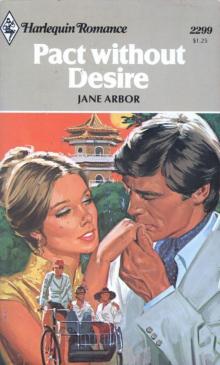 Pact without desire
Pact without desire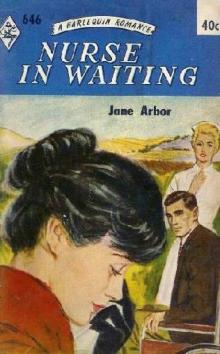 Nurse in Waiting
Nurse in Waiting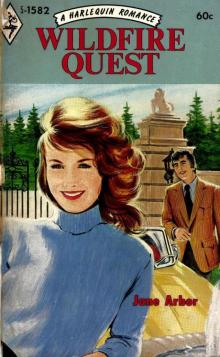 Wildfire Quest
Wildfire Quest Roman Summer
Roman Summer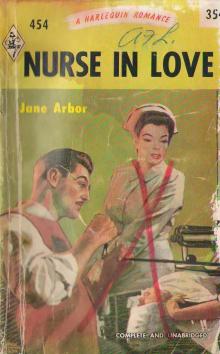 Nurse in Love
Nurse in Love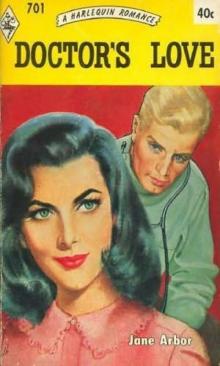 Doctor's Love
Doctor's Love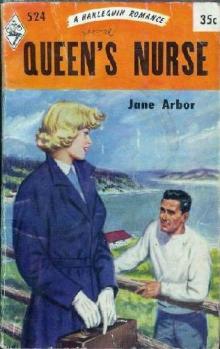 Queen's Nurse
Queen's Nurse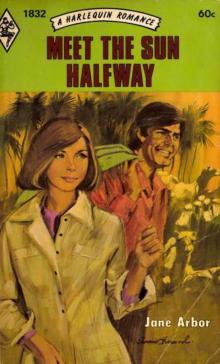 Meet the Sun Halfway
Meet the Sun Halfway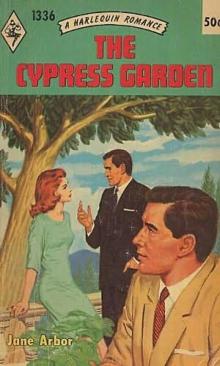 The Cypress Garden
The Cypress Garden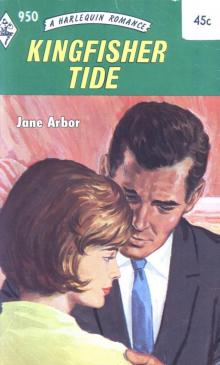 Kingfisher Tide
Kingfisher Tide A Growing Moon
A Growing Moon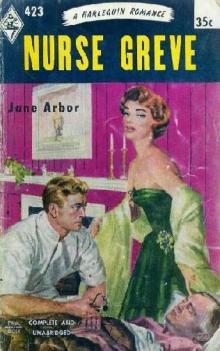 Nurse Greve
Nurse Greve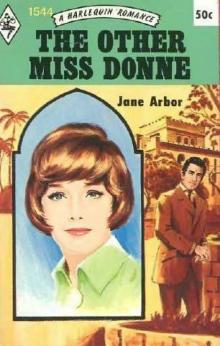 The Other Miss Donne
The Other Miss Donne